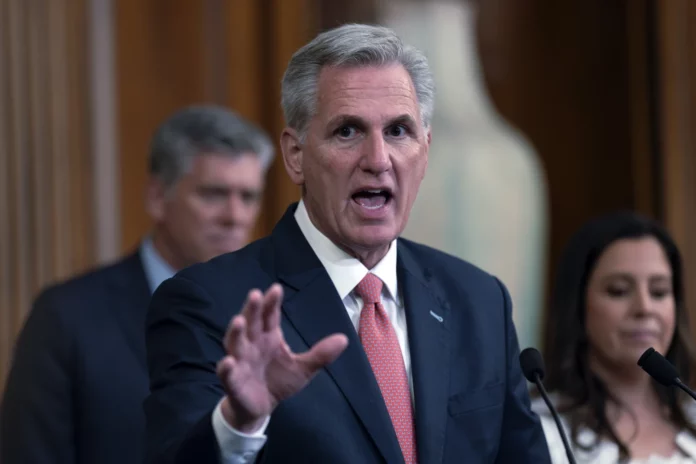
By Casey Harper | The Center Square
Lawmakers are scrambling to avoid a partial government shutdown this week.
Funding for the federal government runs out at the end of September, Saturday at midnight, and lawmakers are still far from getting agreement on a deal that President Joe Biden can sign into law.
In the House, Speaker Kevin McCarthy, R-Calif., has been unable to persuade enough conservative Republicans to back his push for a Continuing Resolution, a temporary funding measure to buy time.
McCarthy may have to work with Democrats to get enough votes on a C.R., but that could jeopardize his position as Speaker. McCarthy won the speakership after a grueling series of votes, and House Republicans have been adamant that they can vote to remove McCarthy at any time.
Senate Democrats have already begun shifting blame onto House Republicans and McCarthy, pointing out House Republicans had time to pass individual spending bills but did not get them done in time.
“I’ve never seen a group that is as hellbent on a shutdown as these crazy MAGA Republicans, that small group,” Senate Majority Leader Chuck Schumer, D-N.Y., told CNN, referring to holdout House Republicans.
Schumer is working on passing a temporary funding measure that can be sent to the House and give Republicans a tough choice: let the government shut down or pass the Senate’s hard-to-stomach version of the spending measure.
Ukraine funding in particular has become a divisive issue that could kill any funding bill. Democrats and many Republicans support it, but a growing contingent of Republicans say taxpayers should no longer keep sending the large sums overseas.
McCarthy has blasted some of the holdouts, for whom Ukraine funding has been a sticking point.
“This is a whole new concept of individuals that just want to burn the whole place down,” McCarthy told reporters last week.
Meanwhile, Senate Democrats are unlikely to favor any measure McCarthy can get passed that appeases conservative Republicans.
While many essential government services would continue operating, many others across a range of federal agencies would be paused if the government shuts down.
Democrats in the past have blasted Republicans for threatening the paychecks of those employees, though they will get back pay once the government reopens.
The shutdown would affect over 2 million civilian employees and military members.
“Nearly a hundred thousand of my constituents won’t get paid during a shutdown. It’s a disaster for Northern Virginia,” Rep. Don Beyer, D-Va., wrote on social media. “They have families who depend on them, and they don’t deserve this. Republicans must honor the Speaker’s agreement with the President, and prevent a shutdown.”
Former President Donald Trump, who has emboldened some Republican holdouts with his support, argued to Republicans that Biden would be blamed if the government shut down.
“The Republicans lost big on Debt Ceiling, got NOTHING, and now are worried that they will be BLAMED for the Budget Shutdown,” Trump wrote on social media Sunday evening. “Wrong!!! Whoever is President will be blamed, in this case, Crooked (as Hell!) Joe Biden!”
“WE NEED NEW, & REAL, REPUBLICAN LEADERSHIP IN THE UNITED STATES SENATE, NOT A CLONE OF MITCH, & WE NEED IT NOW!!!” Trump added.
Meanwhile, fiscal experts warn that the federal government’s continued debt spending is unsustainable and will continue to have major consequences for taxpayers. Earlier this month, news broke that the U.S. national debt surpassed $33 trillion, the highest ever.
The U.S. Congressional Budget Office released earlier this month its estimate of the federal deficit 11 months into the fiscal year. That deficit hit about $1.5 trillion. At the same time last year, the deficit was under one trillion dollars.
As The Center Square previously reported, within a few years the cost of interest payments on the national debt will soon cost taxpayers more than spending on national defense. In fact, interest payments on the national debt are on pace to become the largest expense for the federal government.
A key impact of that debt spending is higher inflation, which has soared in recent years and spiked again in August. Debt spending is offset in part by printing more money, increasing the money supply and inflation as a result.
Food and gas prices in particular have risen. The U.S. Department of Agriculture projects food prices will continue to rise through 2024.
Republished with the permission of The Center Square.













